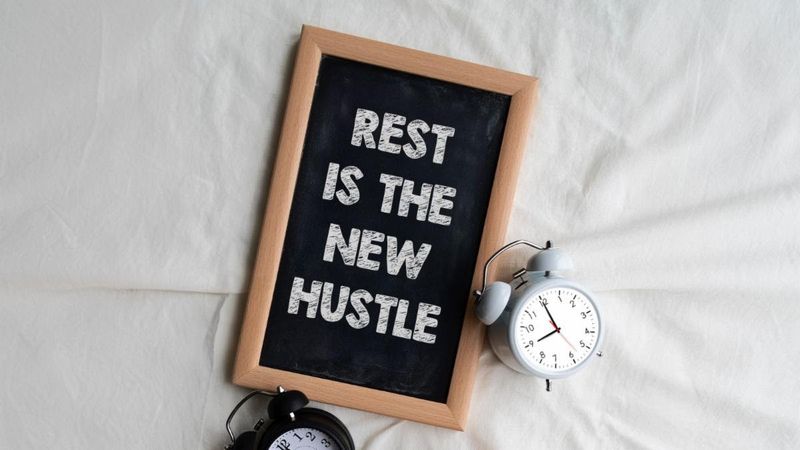As Gen Z enters the workforce, they’re bringing fresh perspectives and attitudes that sometimes leave older generations scratching their heads.
These young professionals are redefining what it means to work and thrive in a professional environment, prioritizing values and quality of life over traditional norms.
1. Prioritizing Mental Health Over Hustle
Gen Z values mental health and doesn’t shy away from prioritizing it. They believe that mental well-being is crucial for optimal performance and are quick to call out burnout.
Instead of pushing through exhaustion, they’ll take a mental health day to recharge. This emphasis on self-care contrasts with older generations, who often view hustle and prolonged work hours as signs of dedication.
Gen Z’s approach to mental health is reshaping workplace culture, encouraging conversations about stress and support tools. Their stance not only benefits themselves but also paves the way for more empathetic work environments.
2. Openly Job-Hopping
For Gen Z, job-hopping is not frowned upon but embraced as a strategy for growth. Unlike previous generations, they don’t feel obligated to stay with one employer for decades.
Instead, they see each job change as an opportunity to acquire new skills, experiences, and increase their market value. This mindset shift reflects a broader change in how career paths are perceived.
Older workers may view frequent moves as instability, while Gen Z considers them essential for career development. This approach encourages employers to offer better growth opportunities and retain their young talent.
3. Embracing “Quiet Quitting”
Gen Z is redefining workplace loyalty by embracing ‘quiet quitting.’ They perform their roles diligently but resist going beyond their job descriptions without proper compensation.
This approach is a response to the exploitative work practices some have experienced. They prioritize fair work-life balance, valuing personal time over unpaid overtime. This behavior is often misunderstood by older generations as a lack of initiative.
However, Gen Z views it as ensuring they are not undervalued or overworked. Their stance encourages companies to reassess how they reward dedication and maintain employee motivation sustainably.
4. Speaking Up to Authority
Unafraid to voice concerns, Gen Z often challenges authority when policies seem unfair or unethical. They believe in transparency and accountability, preferring open dialogues over silent compliance.
This behavior is rooted in a deep sense of justice and a desire for positive change. Older generations may see this as confrontational, but for Gen Z, it’s about improving the workplace.
Their willingness to speak up can drive companies to create more inclusive and fair environments. Encouraging open communication helps bridge generational gaps, fostering understanding and mutual respect across all levels of an organization.
5. Rejecting the 9-to-5 Grind
The traditional 9-to-5 workday holds little appeal for Gen Z. They favor flexibility and remote work options that allow them to balance personal and professional life according to their preferences.
This generation questions the necessity of rigid schedules, advocating for results over hours clocked. They thrive in environments that prioritize productivity and work-life harmony rather than mere attendance.
This shift challenges older norms, prompting companies to rethink how work is structured. The desire for flexible schedules is reshaping workplace policies to accommodate different lifestyles and enhance employee satisfaction.
6. Open Salary Talk
Gen Z is breaking long-standing workplace taboos by discussing salaries openly. They believe in transparency and use salary information to negotiate fair pay. This open dialogue helps bridge pay gaps and ensures equity within the workplace.
Older generations may find this uncomfortable, as salary discussions were traditionally private. However, for Gen Z, it’s a tool for empowerment and fairness.
By advocating for open conversations about compensation, they are pushing for a shift towards more equitable practices. This openness encourages employers to evaluate their pay structures and fosters trust and accountability among employees.
7. Demanding Diversity and Inclusion
Gen Z expects genuine diversity and inclusion from their employers, not just empty promises. They value representation and accountability, seeking workplaces that reflect real-world diversity.
This generation is vocal about their expectations, advocating for inclusive policies and practices. Older generations may have accepted surface-level diversity efforts, but Gen Z demands authenticity.
They believe that diverse teams drive innovation and success. Their commitment to diversity and inclusion encourages companies to reevaluate their strategies and practices. This drive for change creates more equitable environments, benefiting everyone and fostering a culture of acceptance and growth.
8. Treating Work as Just One Part of Life
For Gen Z, work is just one part of a multifaceted life. They strive for a balanced existence where career does not overshadow personal interests and relationships. This perspective contrasts with older generations who often equated work with identity and success.
By valuing hobbies, social life, and downtime, Gen Z is reshaping perceptions of work-life balance. They challenge the notion that long hours equate to success, advocating for a more holistic approach to fulfillment.
This mindset influences workplace culture, encouraging companies to support diverse interests and promote employee well-being beyond just professional achievements.
9. Side Hustle Culture
Gen Z embraces the side hustle culture, often maintaining multiple income streams alongside their primary jobs. They prefer not to rely solely on one employer, seeking financial independence and diverse experiences.
This approach is pragmatic, allowing them to explore passions and build skills outside their regular roles. Older generations might view this as unfocused, but for Gen Z, it’s strategic. Side hustles offer a safety net and opportunities for growth.
This inclination influences how companies view employee engagement and retention, encouraging support for entrepreneurial efforts and flexibility in workplace arrangements.
10. Valuing Purpose Over Paychecks
For Gen Z, job satisfaction comes from purpose and impact, not just paychecks. They are willing to accept lower salaries if the work aligns with their values or contributes to societal good.
This generation prioritizes meaningful work that resonates with their personal beliefs. Older generations often focused on financial stability, but Gen Z seeks fulfillment and significance.
Their preference for purpose-driven roles challenges companies to redefine their missions and values. This shift encourages organizations to focus on social responsibility, creating roles that cater to individuals looking to make a difference while pursuing their careers.
11. Rejecting Dress Codes
Gen Z challenges traditional dress codes, advocating for comfort and self-expression at work. They believe attire should not impact job performance and question the relevance of strict dress rules.
Older generations might equate formal wear with professionalism, but Gen Z sees it differently. They argue that skills and results matter more than appearance. This perspective pushes companies to rethink their dress policies, allowing more flexibility and creativity.
By embracing individuality, workplaces can foster a more inclusive environment where employees feel valued for their contributions rather than their conformity to outdated norms.
12. Calling Out Corporate Jargon
Gen Z is not impressed by corporate jargon. Phrases like ‘synergy’ and ‘circle back’ often receive skepticism rather than compliance. They prefer clear, direct communication that avoids unnecessary complexity.
This generation values transparency and authenticity, finding jargon to be a barrier rather than a bridge. Older workers may see such language as part of business culture, but Gen Z seeks substance over style.
Their preference for straightforward communication encourages companies to simplify messaging and focus on genuine dialogue. This clarity benefits everyone, ensuring that important ideas are understood and acted upon effectively.
13. Expecting Fast Promotions
Gen Z is eager for career advancement and doesn’t believe in waiting years for a promotion. They prioritize results and performance over tenure, challenging traditional advancement paths.
Older generations may see this as impatience, but for Gen Z, it’s about merit and contribution. They seek opportunities to grow and lead, valuing innovation and efficiency.
This attitude forces companies to rethink their promotion criteria and reward systems. By recognizing talent and potential early, workplaces can motivate young professionals and harness their energy and creativity for organizational success.
14. Demanding Work-Life Balance from Day One
Gen Z demands work-life balance from the start of their careers. They reject the notion of earning balance after years of sacrifice, viewing it as a fundamental right. This generation values personal time and believes that a healthy balance leads to better productivity and happiness.
Older generations often worked long hours before achieving such balance, but Gen Z expects it immediately. Their insistence on work-life balance influences employers to adopt flexible policies and mindful scheduling.
By promoting a culture that respects personal boundaries, companies can attract and retain young talent, fostering a more sustainable and engaged workforce.
15. Normalizing Boundaries
Gen Z is redefining workplace boundaries, choosing not to blur lines between work and personal life. They resist after-hours emails and calls unless truly urgent, emphasizing the importance of personal time.
This stance challenges older norms where being constantly available equated to commitment. Gen Z believes in quality over quantity, ensuring work doesn’t infringe on personal well-being.
Their approach encourages a healthier work culture where employees respect each other’s time. By establishing clear boundaries, Gen Z is advocating for a more focused and efficient workplace that benefits both individuals and organizations.
16. Working Smarter, Not Longer
Efficiency is key for Gen Z, who prioritize working smarter over longer hours. They embrace technology and automation to streamline tasks, questioning why certain jobs take more time than necessary.
This generation challenges the traditional notion that long hours equal hard work. Instead, they focus on results and innovation, seeking ways to optimize productivity.
Their approach inspires companies to invest in tools and strategies that enhance efficiency. By valuing smart work processes, Gen Z is driving a shift towards more effective and agile business practices, benefiting both employees and employers in the long run.
17. Using Social Media at Work
To Gen Z, social media is a tool, not a distraction. They use platforms for networking, trend research, and creativity, integrating them into their workflow. Older generations might view social media at work as slacking off, but Gen Z sees it as an extension of their professional toolkit.
They argue that it enhances connectivity and access to information. Their approach encourages companies to rethink social media policies, understanding its potential for business growth and employee engagement.
By leveraging social platforms, Gen Z is transforming how communication and collaboration occur in the modern workplace.
18. Rejecting Traditional Hierarchies
Gen Z values collaboration and respect over traditional hierarchies. They believe in flat structures where ideas are valued over titles. This generation emphasizes teamwork and mutual respect, challenging older systems that prioritized rank.
For Gen Z, collaboration fosters innovation and inclusivity. Their preference for egalitarian structures encourages organizations to rethink leadership models. By promoting open dialogue and valuing diverse perspectives, companies can create environments where creativity thrives.
This shift aligns with Gen Z’s belief in equal opportunity and shared success, paving the way for more dynamic and responsive workplaces.
19. Quitting Without Guilt
Gen Z doesn’t hesitate to quit jobs that don’t meet their expectations or align with their values. They prioritize personal growth and well-being over loyalty to a company.
This generation challenges the stigma around job-hopping, viewing it as a necessary step towards finding fulfilling work. Older generations may see this as impulsive, but for Gen Z, it’s about staying true to oneself.
Their attitude encourages companies to focus on employee satisfaction and retention strategies. By understanding and meeting the needs of their workforce, organizations can create environments where young professionals feel valued and motivated.



















